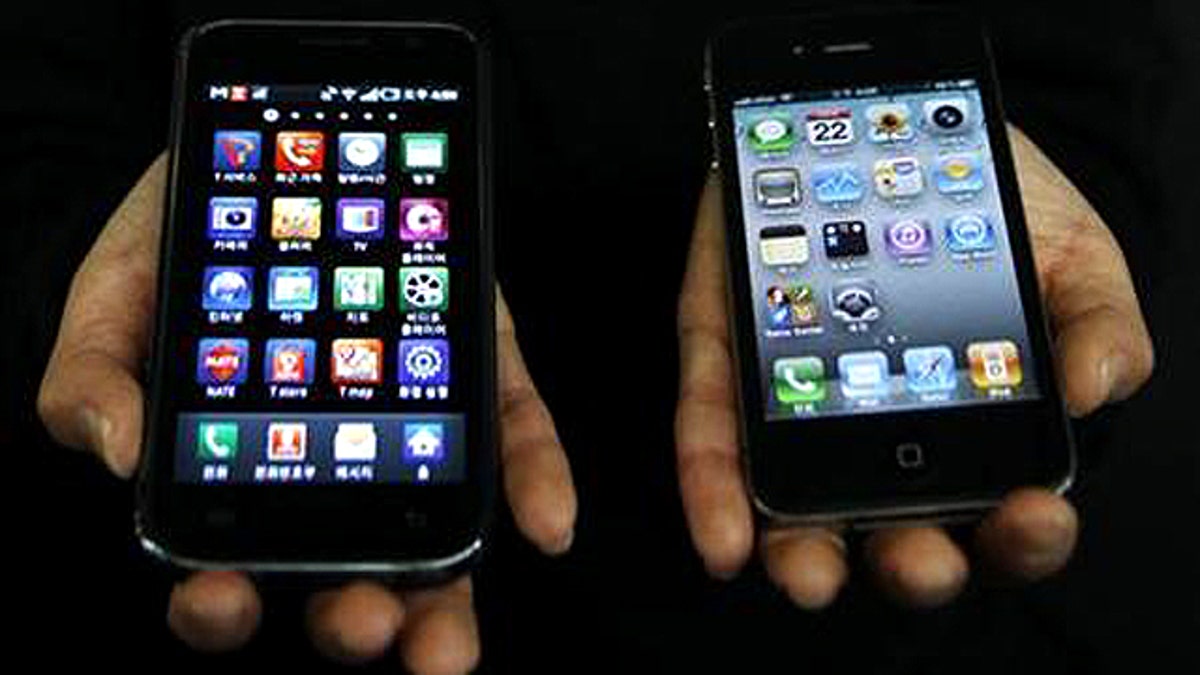
April 22, 2011: An employee of South Korean mobile carrier KT holds a Samsung Galaxy S (L) and an Apple iPhone 4 (R) at KT's headquarters in Seoul. (Reuters/Truth Leem)
A top Samsung executive says the company will take a bolder stance in its patent battle with smartphone and tablet rival Apple, which Samsung claims has been "free riding" on its patented wireless technologies.
"We'll be pursuing our rights for this in a more aggressive way from now on," Lee Younghee, head of global marketing for mobile communications, said Friday in an interview.
Lee, a senior vice president at Samsung, did not say what form the South Korean company's stronger stance would take or if there would be more lawsuits. But her remarks suggest a definite change in tone. She described its previous approach as "passive."
So far, Samsung has mostly spoken about the dispute through press releases and comments by anonymous company officials in South Korean and foreign media. The public nature of the comments appeared to back up recent South Korean media speculation the company was planning to go on the offensive.
The fight began when Apple sued Samsung in April in the United States, alleging the product design, user interface and packaging of Samsung's Galaxy devices "slavishly copy" the iPhone and iPad.
Samsung has responded with its own lawsuits accusing Apple of violating its intellectual property. The fight has spread to 10 countries, according to Samsung, including the U.S., South Korea, Germany, the Netherlands and Australia.
The battle is all the more complex as Apple and Samsung are not only competitors in the fast-growing global market for smartphones and tablet computers, but also have a close business relationship.
Samsung Electronics Co., the world's biggest manufacturer of memory chips and liquid crystal displays, supplies some of the key components that go into Apple Inc. products.
Lee said that Samsung has kept that relationship in mind amid the dispute with the Cupertino, California-based company, and has largely been pulling its punches.
"We've been quite respectful and also passive in a way" in consideration of those links, Lee said during the interview in her office at Samsung's headquarters building in southern Seoul. "However, we shouldn't be ... anymore."
Lee said that Samsung holds numerous patents covering wireless telecommunications technology. Samsung says such patents cover key functions including allowing a mobile phone user to speak on the phone and receive an e-mail at the same time.
"We believe Apple is free riding" on such Samsung patents, Lee said.
Apple reacted to Lee's comments by reiterating its claim Samsung has violated its intellectual property.
"It is no coincidence that Samsung's latest products look a lot like the iPhone and iPad, from the shape of the hardware to the user interface and even the packaging," said Seoul-based spokesman Steve Park. "This kind of blatant copying is wrong and we need to protect Apple's intellectual property when companies steal our ideas."
Lee's comments came after a German court ruled earlier this month that Samsung cannot directly sell its new Galaxy Tab 10.1 tablet in the country, saying the design too closely resembles Apple's iPad 2. Samsung has appealed the decision.
Samsung ranked No. 2 globally in smartphones behind Apple in the second quarter of this year, according to U.S.-based market research firm IDC, which cited the growing global popularity of the Galaxy S smartphones. In overall mobile phones, Samsung ranks second behind Finland's Nokia Corp.
The Suwon, South Korea-based company got a late start in smartphones after Apple shook up the industry with the launch of the iPhone in 2007, but has come on strong.
Lee painted an optimistic portrait of Samsung's future growth and said she believes it can eventually take the No. 1 spot in smartphones and mobile phones.
"We are striving to continue this growth momentum and someday we can imagine that we can be in the leading position," she said, emphasizing that Samsung has a broad array of hardware, functions, operating systems - Google's Android, Microsoft's Windows and Samsung's own bada - prices and presence in global markets.
"We are aware of the importance of branding so we'll be reinforcing this Galaxy branding," she said of the Android-based devices.
Regarding Google's proposed $12.5 billion deal to buy mobile phone maker Motorola Mobility, Lee said the plan has not changed Samsung's relationship with the Mountain View, California-based search engine.
"We still have a very good relationship," she said. "We are working very closely with Google."
Lee joined Samsung in 2007 from French cosmetics maker L'Oreal. Makeup and mobile phones have a lot in common, she said, in that both are focused on individual expression.
Mobile phones, she said, are not just technology, but "a culture and showing who I am, where I belong, how trendy I am."








































